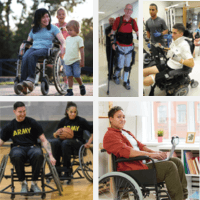Collateral Damage (Episode 119)

Guest: J. Andrew Taylor
This episode is our version of a special bulletin. And we are interrupting our regularly scheduled programming with this update on a major setback for SCI research. On March 15th, Congress passed a bill which eliminated arguably the most effective Spinal Cord Injury Research program in the world. The program made up between one quarter and one third of the entire Federal allocation of funding toward SCI Research.
This obscure program, administered by the Department of Defense had as its primary goal the treatment and recovery of spinal cord injury for the war-fighter and by extension, US citizens. It was called the Spinal Cord Injury Research Program (SCIRP) and it was nested within the larger Congressionally Directed Medical Research Program (CDMRP).
Dr. J. Andrew Taylor is the Associate Chair of Research in the Dept. of PM&R at Harvard Medical School. Andrew’s path as a researcher of SCI actually began with a grant from the SCIRP program way back in the day. As his career progressed, he became a Peer Reviewer for SCIRP and eventually a Programmatic Panel Member, where he has served for the last five years.
Andrew knows this program well and we discuss how the program worked, what made it so successful, what set it apart from other Federal research grant programs and the damaging fallout that will ensue if we can’t get it reinstated. We hope that you will share our sense of urgency on this matter, that you will contact your Congressional Representatives in the House and Senate. And we hope that this conversation empowers you with appropriate frustration and information to be effective in this moment.
Listen on: Spotify | Apple Podcasts | Soundcloud
Bumper music: Dig a Hole by Freaque
Guest Bio
Dr. Taylor is the Principal Investigator for Spaulding’s Cardiovascular Research Lab. He holds a Ph.D. in physiology from the University of Arizona. He had postdoctoral fellowships at Duke University Medical School and the Medical College of Virginia before joining the Harvard Medical School Faculty. He is currently an Associate Professor at Harvard Medical School, Associate Chair for Research in Physical Medicine and Rehabilitation, and a Fellow of the American Heart Association. He has published over 100 research articles on topics such as the impact of microgravity on blood pressure control in astronauts, the effects of exercise on human aging, and most recently the beneficial effects of functional electrical stimulation of the legs for rowing exercise in those with spinal cord injury. You can view his full CV here.
Related Resources
-
This bill cut about $850 million dollars in medical research funding being conducted for veterans, with civilians benefiting as well...
-
There is a terrible irony hiding in the news this past week. The Federal Budget that passed last Friday (3/14) cut 57% - approximately $850 million - out of the Congressionally Directed Medical Research Program (CDMRP)...





















